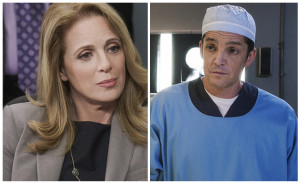
Over the years, DDA Andrea Hobbs and Dr. Fernando Morales have become valued parts of the Major Crimes team, and massive fan-favorites along the way. We chatted with Kathe Mazur and Jonathan Del Arco to find out just what makes their characters tick, and what all that sass is really about.
MajorCrimesTV: You guys are just about at the halfway point of filming for this season – how’s it all been going?
Jonathan Del Arco: I think we’re having an amazing season this year. I feel like the work is getting deeper and deeper for all of us, in different ways. And from my end, the work we do aside, I have gratitude to the fans right now for having continued to find us. The times keep changing, and you guys find us, the days change, and you find us, and I feel like that fed a lot of our enthusiasm to come to work, and the writers to write, and James to do all that he does because he knows you guys get it. And so, it’s very gratifying. Vis-a-vis the ratings and the fact that we’re crushing it, as it were, that way makes me very happy.
Kathe Mazur: I agree! I couldn’t have said it better.
MCTV: It seems like this move to 10pm this season has allowed the show to change tone a little bit, and allowed the show to explore some things a little more deeply.
KM: Well, to me, the very best of life is when you’ve taken an obstacle or something that you thought was going to be a problem and somehow it ends up creating a whole new opportunity. I think that in the work, and I think that in everything, that that’s the highest level because life is filled with obstacles. So, the thing that keeps amazing me about this crew, is that no matter what the obstacle is, it sort of ends up leading to something fantastic and unexpected, and I continually am amazed at how at every single step along the way of this journey that has happened.
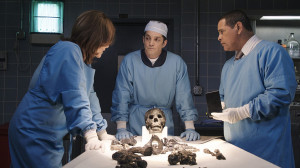 JDA: We all have had our share of anxiety about the change, because we were in the same time slot for so long. But, we have such great leadership in James Duff and Mike Robin, and we were all encouraged by them early on to say, “You know what? Let’s just hit it out of the ballpark and have the best year ever, and just focus 100% on creating an amazing work.” A “if you build it they will come” mentality. And it’s so great to actually see that happen, and it’s so rare, because television is not being viewed as much as other mediums these days, so it’s great to know that we were able to meet the challenge, and we were able to bond together to get through it, and here we are! It’s been fantastic. We’re very lucky.
JDA: We all have had our share of anxiety about the change, because we were in the same time slot for so long. But, we have such great leadership in James Duff and Mike Robin, and we were all encouraged by them early on to say, “You know what? Let’s just hit it out of the ballpark and have the best year ever, and just focus 100% on creating an amazing work.” A “if you build it they will come” mentality. And it’s so great to actually see that happen, and it’s so rare, because television is not being viewed as much as other mediums these days, so it’s great to know that we were able to meet the challenge, and we were able to bond together to get through it, and here we are! It’s been fantastic. We’re very lucky.
MCTV: It has been! Now, I loving having the chance to talk to the two of you together, because both of your characters have both become such strong fan-favorites. Both of you are also known for your characters’ sass and for having a little bit more attitude than maybe we get to see out of some of the others. Was that something that developed in the characters for you over the years, or was it always sort of inherent in the writing?
JDA: I was being myself! (laughs)
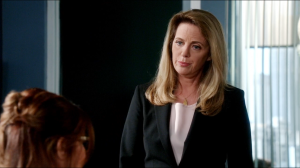 KM: I think that you hit it on the head. I mean, I think that it was inherent in Jonathan and it’s inherent in Hobbs, but the fact that those sasses have ended up being connective in some way, even though we’re generally not even in scenes together, is kind of fun for us.
KM: I think that you hit it on the head. I mean, I think that it was inherent in Jonathan and it’s inherent in Hobbs, but the fact that those sasses have ended up being connective in some way, even though we’re generally not even in scenes together, is kind of fun for us.
JDA: It’s really odd because we don’t have that many scenes together, but it’s like two sides of one coin in a way, in that neither one of us suffers fools, personally or as the characters. We ain’t got time for that (laughs). We’re all really funny, by the way. We love to go out and eat and drink (more laughter). So, it is an interesting kind of exploration of that personality within a work environment. Like ‘Come on, I’m doing my job, you do your job.’
KM: And I also think that that we have complimentary positions in the show because we are not part of the regular team. So we have outsider status as characters which gives us the freedom of getting sort of wafted in and let loose.
JDA: Right. And also in a strange way we’re something like the audience, if you will, because we’re not necessarily always in the room, in terms of what’s happening with the cops. We get to come in and be like ‘Are you guys crazy?’ So in some ways it’s a bit like an audience member would be. Maybe that’s why the audience identifies with our characters so much.
KM: But, you know, it’s very interesting, this audience. This audience continues to amaze me, because they don’t miss a beat. They catch everything, you know, when I look on twitter and I see the quotes that they’re picking up, they’re catching everything. So it’s very satisfying, and must be satisfying for the writers to write for, because they catch everything the writers come up with.
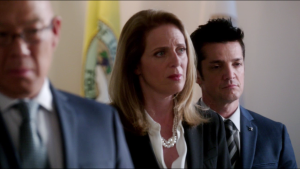 MCTV: Absolutely, and the fans really do love finding the little moments, the Easter eggs, within the show. Another similarity in your characters is that we’ve seen both of them frequently for many years. Jonathan, you’re a series regular, and Kathe it’s been great that we’ve been seeing more of you with each season. But despite that, we don’t have much back-story on either of your characters. We’ve gotten a little bit here and there but how do work around that? Do you both have sort of your internal back-stories for your characters? Or do you go with just what’s on the page and wait till each bit gets more fleshed out?
MCTV: Absolutely, and the fans really do love finding the little moments, the Easter eggs, within the show. Another similarity in your characters is that we’ve seen both of them frequently for many years. Jonathan, you’re a series regular, and Kathe it’s been great that we’ve been seeing more of you with each season. But despite that, we don’t have much back-story on either of your characters. We’ve gotten a little bit here and there but how do work around that? Do you both have sort of your internal back-stories for your characters? Or do you go with just what’s on the page and wait till each bit gets more fleshed out?
KM: One of my favorite things about this show is that it is a workplace. And it’s a workplace with people who are good at their jobs and work very, very hard to do the best job they can. And if you go into a police station and you’re there for the day, you’re not going to end up knowing very much back-story about anybody there. But what you will get is the essence of their humanity-
JDA: Right
KM: -in whatever shape that is. And I think that it’s written with so much sensitivity to each character’s different tone. And I feel like if I’m just playing what’s on the page, there’s a whole world of many possible back-stories that come out. And also many not-possible back-stories. I don’t think anyone thinks I, as Hobbs, is happily married with children, even though it’s never been mentioned, what I have or don’t have. But it’s clear that I’m very much a lone wolf as a human being in certain ways.
JDA: You’re single and boozy, I hope!
KM: I’m single, and we don’t know how it got that way, but it wasn’t because my attitude was so good.
JDA: I don’t tend to overload scenes with too much history that I need to make up. I only do that as an actor, if I feel like I’m not connecting and I’ve never felt that way–
KM: Like something’s missing
J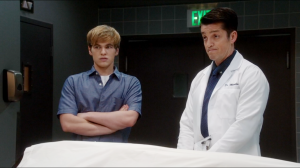 DA: Yeah, if something missing, but there’s nothing missing, like Kathe said. You show up to work, you’re not necessarily being drawn by everything that happened to you in your whole life, right?
DA: Yeah, if something missing, but there’s nothing missing, like Kathe said. You show up to work, you’re not necessarily being drawn by everything that happened to you in your whole life, right?
Having said that, there was a script about a month ago that a single line in it, that made me have this crazy, like, actor moment where I realized things about my character from The Closer, all the way to here, that motivated why he became a coroner and what are his soft spots, which tend to be when he’s examining children or women that had been raped. And I was like, ‘Wow-that makes so much sense to me!’ And I told James and some other people, and they looked at me like I was crazy, but when it makes sense to you, it makes sense to you as an actor, and that’s all that should really matter, in terms of a back-story.
KM: And I also think it allows, like you said about the Easter eggs, that I think that the writers have had a lot of fun on this show with kind of just doling out information about people, a little here, a little there. And I think that James and Michael really bring in back-story when we need that back-story, when that back-story actually serves the show, instead of just inventing inorganic, ‘Oh, it’s time to have a personal moment’ excuses.
JDA: It always is such a part of the show, and is so tied to the theme of the seasons too. Like right now Buzz is having this whole season with the Dad thing, right? And those things sort of ricochet off of each episode. So if there was an issue with a dad and his son, you’d see Buzz having a moment about that. So, James, in particular when he’s structuring the season with the writers, is very into threading themes and ideas into the stories, and what the themes are that they play off of sort of bounce back to us as the actors.
It might have been the beginning of last season, where I thought I was way less snarky. And for some reason that fit better within the theme, I was very much business as usual last season, just doing my job, and I feel like this season that’s been completely different. I mean, they pull up, in that episode that aired a few weeks ago this attitude I had about structural government, if you will. I’m basically saying ‘I don’t work for you,’ to the FBI. That’s a callback to the first season of The Closer where I basically said, ‘I don’t work for you, I work for the county.’ So I love that they’re circling back to those ideas that were originally part of our characters.
KM: When I started the show, I didn’t know about the themes. I didn’t realize the over-arching intelligence that would take a whole season and that was really thought out in a certain way. And now at the beginning of every season I want to know what the theme is, because I like to also find out how that applies to me, not only as the character, but as the actor.
Like, okay, we’re taking on this theme, what is this theme in my life? Let’s bring that to the way that I approach being on the set. Why not? Somebody gives you something intelligent, why not use it? Why not go think, ‘Okay, how does that apply to me? And sometimes if I’m taking a look at a certain scene, then I can think about how does this scene fit into that theme, and how can I help the theme by the way that I look at my part in it? Because I do think that I am of service, and my character is of service to the story. It’s not “The Hobbs Show”, it’s a marathon of service. I’m not in the scene if I’m not usable, if I’m not useful. And if I’m not useful to move the whole thing forward, I wouldn’t be there. So it’s been a great thrill for me to go to look for that, to think, ‘Okay, I need to be of service to this story, how can I do that, on a deeper level’?
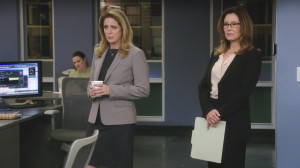 MCTV: Kathe, one thing we don’t see a ton of in the show, because so much of the team is made up of men, is that we don’t see much of women interacting. One thing fans have really latched onto is that Hobbs is another female voice in the show, and without it ever being said explicitly, seems to be another sounding board for Sharon Raydor. I think a lot of viewers would hope that Hobbs and Raydor are friends outside of the office. How have you approached that relationship, to kind of play this professional woman dealing with another professional women, which we don’t always see in the non-confrontational, great working relationship that these two have together?
MCTV: Kathe, one thing we don’t see a ton of in the show, because so much of the team is made up of men, is that we don’t see much of women interacting. One thing fans have really latched onto is that Hobbs is another female voice in the show, and without it ever being said explicitly, seems to be another sounding board for Sharon Raydor. I think a lot of viewers would hope that Hobbs and Raydor are friends outside of the office. How have you approached that relationship, to kind of play this professional woman dealing with another professional women, which we don’t always see in the non-confrontational, great working relationship that these two have together?
KM: I agree. I love doing scenes with Mary. I just love it. And it is distinct, you know, when two professional women who are powerful are having a conversation that isn’t about men, and love. It is true that women’s subject matter, if it’s not professional, can tend to get a lot about relationships, as though women don’t think about other things besides their kids and man, or their love life. And I think it’s really powerful–I think I can speak for Mary–I think we both love those scenes, that there is a female-ness that comes into our communication that isn’t necessarily what we’re talking about.
But the way that we go about it and the way that we relate has absolutely to do with the fact that we’re women.
I think that’s why it reads as a friendship, because women relate differently than men. And women relate – I’m a little bit of a nerd, so to get linguistic, women relate through sameness, through understanding each other. And men linguistically have a lot more competitive language..
JDA: Adversarial, one-upping…
KM: And women just linguistically don’t do that. I mean, if women are doing that, there’s a huge problem in the relationship. So I think that when Mary and I are doing a scene and we’re just talking about the police issues or the law issues, I just think that there is always an effort, from being female on both of our parts, to say, ‘How can we understand each other? How are we alike, in this thinking?’.
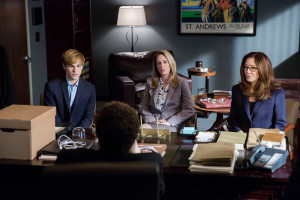 And that is the way that women bond. And I think that’s true in most scenes, that there’s a sense of, ‘How do you have my back? How do you understand me? How are we on each other’s side?’ And I’ve seen that grow through the seasons. It was very present around the adoption of Rusty, which I think was, with the exception, maybe, of Andy’s time in the hospital, the most emotional stuff between us. And I always feel that when the door closes and Mary and I are in her office together, there’s something else that’s happening.
And that is the way that women bond. And I think that’s true in most scenes, that there’s a sense of, ‘How do you have my back? How do you understand me? How are we on each other’s side?’ And I’ve seen that grow through the seasons. It was very present around the adoption of Rusty, which I think was, with the exception, maybe, of Andy’s time in the hospital, the most emotional stuff between us. And I always feel that when the door closes and Mary and I are in her office together, there’s something else that’s happening.
MCTV: Absolutely. And as a viewer it’s wonderful to see, because it feels like it’s not only a different side to those characters, but to the show itself in those moments.
KM: Yes, I agree.
MCTV: Jonathan, in terms of Morales, I think he might be one of the poster children for gallows humor.
JDA: (laughs) Literally!
MCTV: How does his snark and attitude come into play with his work? Again, it kind of goes back to the question of is that just his nature, or is that displacing some of the discomfort that is dealing with this job, that can often be seeing some of the worst of humanity?
JDA: I think it’s a little of both. I think he’s a very sensitive person and a very deep-feeling person. And in order to get through the day, doing that kind of work, he has to have fun, in whatever way possible. It’s not always the case, and it’s not always successful for him, right? Because some cases get under his skin in a real way. So it’s case by case in terms of that.
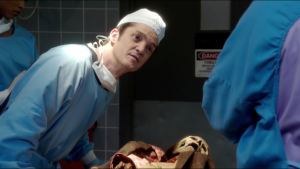 I don’t want to call it a defense mechanism, but maybe a coping mechanism. I mean, there are elements to my job that you never see, really. Or that you see very little of, and that’s notifying families, and showing families the bodies – that’s a hard part of a job. And, you know, releasing bodies to families, having to see that day in and day out, almost completely separate from the autopsy aspect of it. Or the heinousness of some of the crimes.
I don’t want to call it a defense mechanism, but maybe a coping mechanism. I mean, there are elements to my job that you never see, really. Or that you see very little of, and that’s notifying families, and showing families the bodies – that’s a hard part of a job. And, you know, releasing bodies to families, having to see that day in and day out, almost completely separate from the autopsy aspect of it. Or the heinousness of some of the crimes.
The episode that stands as a stark reminder to me of when he’s not that way have been ones where he’s had the rug has just pulled out from under him by the level of cruelty to a victim that he’s rendered without any of those tools, and almost speechless. And that can’t happen every day, if that’s your job. Cops can’t be sad every day because they’re dealing with people being shot. It would be impossible to make it through your day like that, if you’re an ER doctor, or policeman, or coroner. But there are things that get under your skin, and it’s personality, but it’s also a protection.
MCTV: Well, we certainly enjoy and appreciate both of your characters, and all they bring to the show. Thank you both for taking the time to speak to us.
KM: And thank you for everything you’ve done for this show, and continue to do. We’re so grateful.
JDA: Yeah!
MCTV: Thank you! We hope to see more of both of your characters this season!
Major Crimes is all new tonight at 10pm/9c on TNT
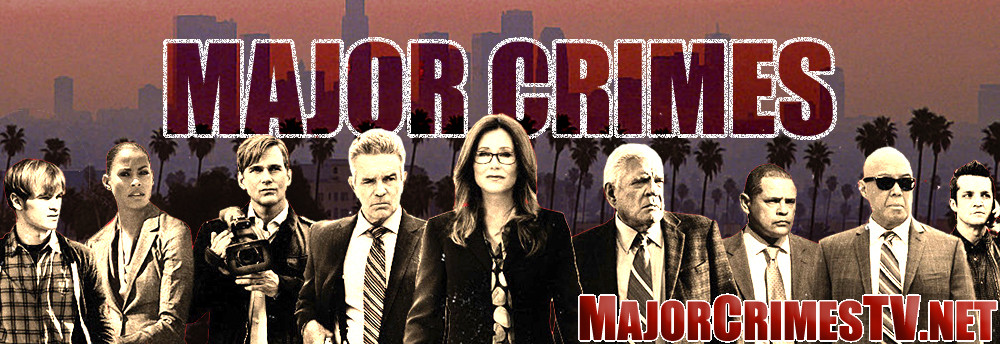
Pingback: Just Fabulous: Jonathan Del Arco Fans » » Interview: MCTV Exclusive – All That Sass
Oh these are interviews are so wonderful. It’s nice to get a deeper look into some of these characters from the actor’s and writers perspectives. In terms of how they see the characters and how they portray them. Verse us as how the audiences sees them. So thank you MCtv for all of these wonderful interviews, podcasts and other articles.